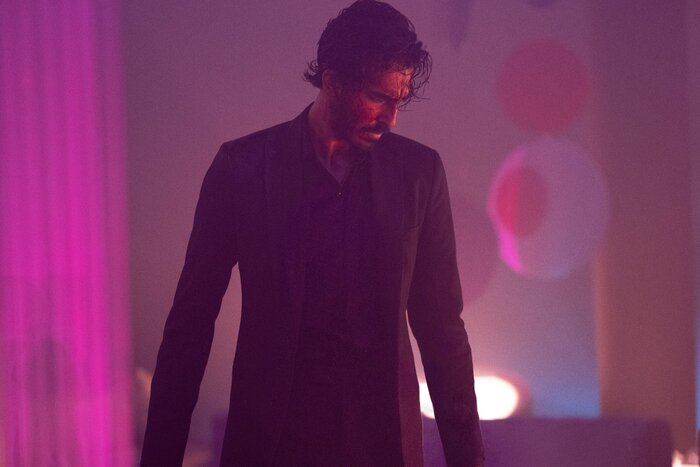Icon: enlarge
Michaela Coel as Arabella
Photo:
HBO / Sky
The beautiful, wild life in the shared rooms, lofts and clubs of a big city has seldom been presented in such an enviable glamorous way as in this series, which is set in London and is at least as much about human meanness as about happiness.
In "I May Destroy You" you see young adults around thirty romping around to electro beats on the dance floor.
You can see them working in penthouse offices and drinking, drug use and sex.
Sometimes they sit alone in the subway.
Sometimes they yell at each other.
Sometimes they fall around their necks howling.
But these people always seem to be filled with the radiant awareness that the world belongs to them in this place and at this moment.
Icon: enlarge
Arabella (Michaela Coel) and Terry (Weruche Opia)
Photo: HBO / Sky
The screenwriter and actress Michaela Coel plays a writer named Arabella in "I May Destroy You".
Arabella's parents once moved to London from Ghana, her best friends are the aspiring actress Terry (Weruche Opia) and the smart dance coach Kwame (Paapa Essiedu).
Arabella has published a bestseller.
It is based on her Twitter diary notes about a young woman's love and life stress.
One evening she went to the microphone in front of the audience at a literature festival and reported that she had been abused a few days ago - by a man in the hall whom she angrily outed as the perpetrator.
The guy flees in panic while the audience films and boos him.
32-year-old Coel did a similar thing in reality in 2018 at the lectern at a festival in Edinburgh.
She spoke publicly about the fact that a few years ago a stranger put narcotic drugs into her drink and raped her - without the public knowing who the perpetrator was.
Outrage, fear, and absurd feelings of guilt
In "I May Destroy You" Coel, who started out as a comedian and had her first success with the series "Chewing Gum" a few years ago, especially in Great Britain and the USA, processes her own trauma.
She does it in an extremely clever, psychologically shrewd way that surprises anew in each of the twelve episodes.
Within a few weeks, Arabella is mistreated in different ways by two different men, both of which she herself regards as rape.
And of course the series, in which Coel himself plays the lead role and co-directed most of the episodes, is about the heroine's indignation, fear and absurd feelings of guilt, among other things.
When an Italian ex-lover tells her that she should take better care of the glass with her drink in bars and clubs in the future, she bursts into tears.
And yet the crimes of the men in "I May Destroy You" are not the center of the drama, but the starting point for the fundamental question of where the assault begins nowadays among younger metropolitan people willing to couple.
In many variations, the series explores how exactly absolute honesty could work during sex, what needs to be said between men and men, women and women, women and men for the purpose of pleasure, and what can be kept secret - and when the offense of sexual violence occurs is.
In pointed, closely observed scenes, Coel's series proves to be an outstanding epic about the manners and cohabitation customs of our time.
Arabella's friend Kwame is gay and uses the tear-open app to meet strangers several times a day for sex, until one of his lovers brutally abuses him.
First he is silent out of shame, then he goes to the police, where he is turned away with a shrug.
Arabella also reports the alleged rapist who poured drugs into her glass and attacked her.
She meets two friendly, committed policewomen - but because the heroine has only vague memory flashbacks and no surveillance cameras were installed in the club, the investigation is closed.
Don't spoil the fun of existence
Would the police have investigated differently if the perpetrator had been black and the victim had been white and not the other way around as in the series?
The characters in "I May Destroy You" speak attentively and excitedly about the racism of their fellow human beings, the exclusion of women, the hateful talk of heterosexuals about gays and trans people.
But they are determined not to let the fun of existence be spoiled for them.
Icon: enlarge
Michaela Coel
Photo: HBO / Sky
The series is driven by the phenomenal intensity, the comedy and the vulnerability of the actress Coel - and by Arabella's efforts to get her life back under control.
In an often gruff manner, she tries to get herself up with the help of her friends and a women's support group, and instigates a feminist riot on social media.
Suddenly she begins to self-righteously hold the fault of her neighbor up to date.
On Halloween, Arabella walks through the streets of London in a costume with black angel wings as if she were a goddess of revenge.
Whose destructive power does the strange series title "I May Destroy You" talk about?
Perhaps it can be interpreted as follows: At the end of the crisis year that is being told here, the furious heroine has gained so much strength that she can be trusted to do almost anything, not only in good, but also in evil.
"I may destroy you",
from October 19th on Sky
Icon: The mirror









